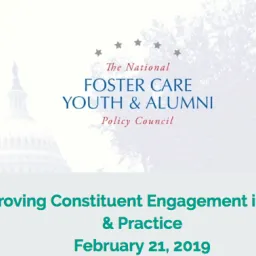On Feb. 21, 2019, The National Foster Care Youth & Alumni Policy Council held a webinar to discuss improving constituent engagement (voices of lived experience in child welfare) in policy and practice.
We heard first-hand about best practices for constituent engagement from young people who experienced foster care and currently advocate for child welfare reform on local, state, and federal levels. Youth engagement allows the child welfare system to better serve young people, their families, and the communities to which they belong. The presenters gave examples of how leadership of young people can improve child welfare practice and policy. The webinar illustrated how meaningful constituent engagement led to the passage of the Family First Prevention Services Act (FFPSA) and how important constituent engagement is to successful implementation of the law.
Council Member Sam Martin urged participants to ask the question, “Are you bringing constituents in on higher-level decision-making processes? Are you engaging them in more than surface level interactions?”
James McIntyre, Council Member, explained, “Once example of how the Council’s Normalcy Priority was utilized in a state effort, was in 2017 when Illinois passed the largest Normalcy bill in history-- eliminating bureaucracy and red tape to increase normalcy. For example, if a kid wanted to sleep over, the Department would no longer require everyone in the house who is over 18 years old to have a background check.”
Reflections from audience members:
“Thank you for an informative webinar as well as using your stories and experiences to help, advocate, and make life better for others!” - Barbara
“We're very excited about the implementation [of Family First Prevention Services Act]! Our Youth Advisory Board has, and will be, meeting with state legislators and the Department of Human Services regarding the implementation of FFPSA! I work with the Youth Policy Institute of Iowa.” - Robert
During the Webinar, the presenters went over the benefits of constituent engagement, which are:
- Improving organizational reputation in/with a community
- Enhancing the capacity to develop innovative services to better serve our families
- Leading to enhanced relationships and understanding
- Supporting the meaningful growth and opportunities for all involved
- Providing a broader perspective, that comes from the experience of individuals touched by the services.
- Resulting in better planning, higher quality decision making, and more informed policies, practices, and programs.
- Creating an opportunity for all to contribute—to have their opinions heard and participate in decisions that affect them.
We've included the slides (linked here) for your viewing. Unfortunately, due to technical difficulties, we don't have a recording of the webinar.
Please reach out to [email protected] if you have any questions regarding the webinar or constituent engagement and how you can apply it to your advocacy or work!

